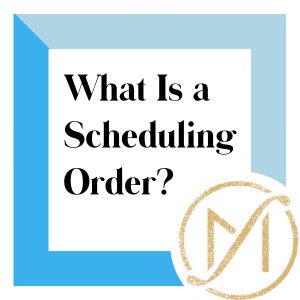What Is a Scheduling Order?

It’s time to talk about family law legal terminology again, and today’s topic is “What is a scheduling order?”
Read on to learn more.
Scheduling Order Basics
A scheduling order is a court order that determines the flow of a litigated divorce, separation, or custody matter from the date it’s entered through trial.
In other words, via a scheduling order, the court can establish dates for trial and other court hearings as well as due dates for discovery. It’s also possible that the court will include dates for court-provided Family Relations services including meetings and ADR tools.
You won’t find every court deadline and hearing date on a scheduling order. Connecticut establishes some dates via the General Statutes of Connecticut, the Connecticut Practice Book, and other court orders such as the Superior Court of Connecticut Standing Orders.
In addition, it’s important to know that the dates the court set out in the scheduling order may change.
When Will the Court Issue a Scheduling Order in My Family Law Case?
For many people, time is a primary concern when they begin a divorce or another family law matter. For example, they might want to know how long they have to wait until their first hearing. Other people may be focused on how long their divorce will take from start to finish.
The scheduling order is important because it gives you a sense of how long you will have to wait to go to court. That said, if you have a low conflict case where we are able to resolve all of the issues in your divorce without a judge, we will likely be able to arrange for an uncontested divorce hearing in relatively short order. The court generally issues its scheduling order following the Resolution Plan Date (or “RPD”). Unless you have been to court for an emergency ex parte motion or a restraining order, the RPD will likely be your first court date.
The RPD is not a hearing in front of a judge, it’s an initial meeting with a Family Relations Counselor.
Next Steps
For more information about Connecticut divorce and family law, check out our Divorce Information and Facts. If you have questions or want to learn more about how our team of divorce attorneys can help you with your divorce or post-judgment issue, please contact us here.








